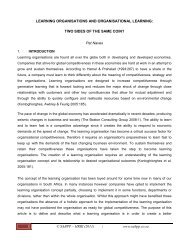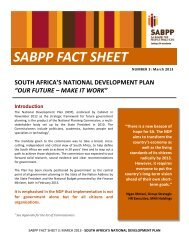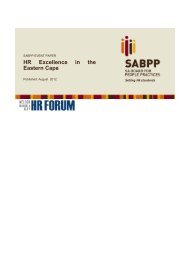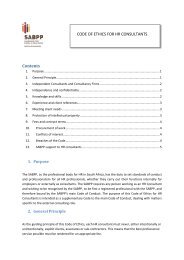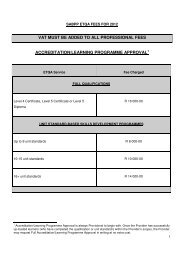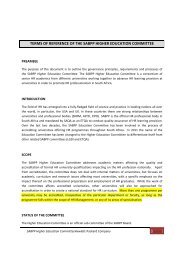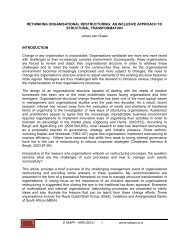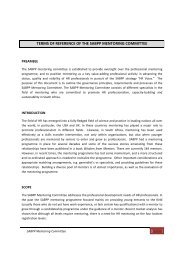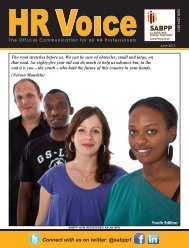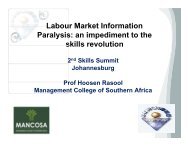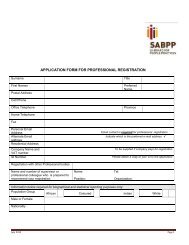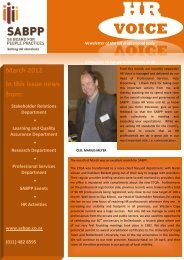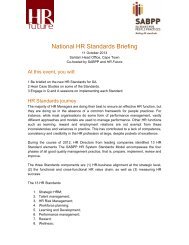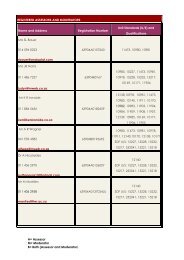May 2012.pdf - SABPP
May 2012.pdf - SABPP
May 2012.pdf - SABPP
You also want an ePaper? Increase the reach of your titles
YUMPU automatically turns print PDFs into web optimized ePapers that Google loves.
HR<br />
VOICE<br />
Newsletter of the HR professional body<br />
<strong>May</strong> 2012<br />
In this issue:<br />
A focus on HR<br />
and<br />
Workers day<br />
Worker’s day: The Right to Choose<br />
By Elizabeth Dhlamini-Kumalo<br />
Chairperson <strong>SABPP</strong><br />
On 1 <strong>May</strong>, South Africa will enjoy Worker's Day. The day can be and is claimed by<br />
various political parties. In South Africa it is understood to be a remembrance of<br />
the role played by Trade Unions, the Communist Party and other labour<br />
movements in the struggle against Apartheid.<br />
Worldwide – it is much more. It is a basic win for Human Rights!<br />
<strong>May</strong> Day, as we know it refers to various socialist and labour movement<br />
celebrations conducted on the 1 st of <strong>May</strong>.<br />
<strong>May</strong> Day was born from the industrial struggle for an eight-hour day.<br />
Stakeholder Relations<br />
Department<br />
Learning and Quality<br />
Assurance Department<br />
<br />
<br />
Research Department<br />
<br />
Professional Services<br />
Department<br />
<br />
<strong>SABPP</strong> Events<br />
<br />
HR Activities<br />
This particular struggle started about ten thousand years ago, as a simple battle for<br />
the ordinary man to sustain himself under increasingly strenuous circumstances.<br />
From the exploitation of serfs, slaves, trades people etc. the struggle has been won<br />
to produce enough to sustain workers and their families. All that changes is the<br />
mask of exploitation under the guise of reward. The exploitation is born off an<br />
imbalance that cannot seem to be addressed, because it works. There is always a<br />
class system that has more. More power, more resources just more…. The “more”<br />
element is then used to exploit those who have less. Less power, less resource and<br />
no voice to represent or establish their rights based on their needs. In this<br />
particular struggle workers have never fought to redress the imbalance, the fight<br />
was simply for the fairness of an eight hour working day that allows the working<br />
class to sustain their input into the system regardless of the name it goes by in that<br />
particular country, be it capitalism or communism, etc.<br />
The right to an eight –hour work day has been won and implemented in various<br />
countries across the world since 1836. The interpretation and adherence thereof<br />
again varies across the world. Gross exploitation of the working class in various<br />
countries is well documented; the main variation to this struggle is that the<br />
exploitation is now owned by organisations as opposed to countries and or a<br />
specific class. This creates an interesting dynamic as the consumer can now choose<br />
to support –through purchasing of goods and services- the various organisations<br />
that are said to be exploiting the workers. As the consumer is often the worker we<br />
now have a system where the worker is seen to be choosing their exploiter 1 and<br />
level of exploitation. However, with all the victories that a worker has won against<br />
“the man” and “the system” it is no longer considered exploitation but rather<br />
choice.
So now the worker has choices (they found their voice) in a system that (on close inspection) has not<br />
changed much. It is still a system of haves and have-nots but has interestingly become peppered with<br />
choice. So those who have to work on Workers’ Day have chosen to do so. It is a hard earned right to choose<br />
to make money on that day!<br />
For the HR Practitioner, to enable the worker to choose, please refer to the Basic Conditions of Employment<br />
Act, 1975 (No. 75 of 1997) which stipulates the minimum terms or conditions of employment for all South<br />
Africans.<br />
Happy workers day! Your right to choose.<br />
THE FRUITS OF SWEAT<br />
It was never a donation<br />
We fought for it,<br />
It was not charity,<br />
But victory of the labourers.<br />
From Kimberly to Sharpeville,<br />
From Soweto to KwaMashu<br />
Down to the intestines of the Earth,<br />
Mining for gold and praising God<br />
The workers won, against the exploiters!<br />
Against discrimination by colour of the skin<br />
Against discrimination by Tribe<br />
Against discrimination by gender<br />
Against forced labour<br />
Against unfair dismissals<br />
Against all forms of evil Isms<br />
The workers won, against the oppressors!<br />
Today we celebrate the musicians,<br />
Who sang the songs of Freedom<br />
Today we celebrate the cadres,<br />
Who cried “Amandla!”<br />
Today we join the world in Celebration<br />
Of Victory of the workers, knowing full well,<br />
That it is the fruits of sweat<br />
And the reward for blood of centuries of struggle!!!<br />
Nelisiwe Mahlangu is a second year journalism student at Damelin Pretoria City<br />
Campus<br />
Today we commemorate those who died<br />
And today we celebrate the victory they<br />
bought,<br />
With sweat and blood<br />
With slogans and strikes<br />
With resistance and protest<br />
With umzabalazo and Toyi Toyi!<br />
And today we remember,<br />
Those who refused to be victims<br />
The men and women who refused fear<br />
The boys and girls in Soweto,<br />
Who refused the language of the powerful<br />
And chose the language of power,<br />
Their mother tongue!<br />
2
STAKEHOLDER RELATIONS<br />
Report on the KZN Summit<br />
The HR Excellence Provincial Summit in Kwa-Zulu Natal was held on the 19th April in Umhlanga,<br />
north of Durban. The summit was well attended with all our speakers touching on key challenges<br />
and achievements relating to Human Resource Management. <strong>SABPP</strong> staff members engaged with<br />
most delegates during breaks to identify their needs and expectations. Books were on sale at the<br />
<strong>SABPP</strong> exhibition stand, if anyone would like to order books they are more than welcome to contact<br />
Siya on siya@sabpp.co.za. These books are also available on email at a minimal cost. The day closed<br />
with a cheese and wine to encourage networking amongst HR professionals and <strong>SABPP</strong> staff.<br />
Key speakers at the KZN Summit held on 19 th April in<br />
Durban<br />
Standing: Idah N.N. Zwane-Dlomo (General<br />
Manager: Corporate Services. KZN<br />
Provincial Treasury); Marius Meyer (CEO of<br />
the SA Board for People Practices); Sipho<br />
Cele (Deputy City Manager Governance and<br />
HR, Ethekwini Municipality; Steven Msomi<br />
(Lecturer and Acting MBA Course Coordinator,<br />
UKZN Graduate School of<br />
Business; Prof Hoosen Rasoul (Managing<br />
Director, MANCOSA); Penny Milner-Smyth<br />
(HR Executive, SA Sugar Association)<br />
Seated: Thapelo Molapo (Vice President<br />
HR and Training, Toyota SA Motors);<br />
Elizabeth Dhlamini-Kumalo (HR Director,<br />
Sandvik Southern Africa and Chairperson of<br />
the <strong>SABPP</strong> Board)<br />
<strong>SABPP</strong> signs an MOU with the Professional Assignments Group (PAG)<br />
On the 2 April 2012, <strong>SABPP</strong> met with Ferdinando Pulella, MD of PAG together<br />
with Laura Pillay and Jacqueline Singh also from PAG. An MOU was signed in<br />
Sandton Johannesburg to form a new alliance between the two organisations.<br />
We would like to thank PAG for engaging with the <strong>SABPP</strong> and we look forward<br />
to our new partnership in raising HR and recruitment standards.<br />
3
LEARNING AND QUALITY ASSURANCE<br />
DEPARTMENT<br />
anyone would like to still order soks they are more tn welcome to contact Siya. These books are also<br />
available on email at a minimal cost. The day ended with a cheese and wine to encourage s<br />
Workers’ rights are still<br />
important today<br />
South Africa is built upon many principles, but one of<br />
the most important things to remember is that it was,<br />
in fact, built. Worker’s day has been celebrated in our<br />
country since 01 <strong>May</strong> 1994. We owe a lot to the hard<br />
work of those who came before us, and—from making<br />
the most of our benefits to making sure we’re getting<br />
the remuneration that we should—it’s time for us to<br />
think toward the future.<br />
<strong>SABPP</strong>, FETC Training Provider- HRM students in the<br />
process of simulating a wage negotiation<br />
We all remember all the stories from our history class<br />
in high school: Industrial Revolution, sweat shops,<br />
child labour, unsafe work environments, no benefits,<br />
no rights for workers… We owe these incredible<br />
advances to the efforts of the labour movement; we<br />
owe it to ourselves never to become complacent in<br />
terms of demanding our rights and knowing our<br />
worth. But mostly importantly, in order to sustain and<br />
grow from all that has been acquired, we need to<br />
work hard; work in excellence and be ethical in all that<br />
we do.<br />
It is also a reminder of the many challenges that still confront us, workers, and the poor in South Africa - and<br />
which remain obstacles to sustainable human development among all developing nations.<br />
The South African working class has been at the forefront of the struggle for a democratic, non-racial, nonsexist,<br />
prosperous and united nation. It has understood and consistently maintained that workplace struggles<br />
cannot be separated from broader social struggles; that economic justice and equality cannot be achieved<br />
without national liberation. It has argued that these struggles cannot be separated from the struggle for gender<br />
equality and, specifically, women's emancipation.<br />
Worker’s day is an important holiday all over the world, for people from Communists to Pagans and everyone in<br />
between. Depending on the context, Worker’s day has a different significance for different individuals, but it is<br />
generally a day of celebration. The significance of the holiday has also changed over the centuries, but HR – as a<br />
catalyst for management and development of people – has a mandate of assisting workers in fully<br />
understanding and fully celebrating this day.<br />
Happy Worker’s Day!<br />
Sindiswa Maseko-Khumalo from TATA Africa and an <strong>SABPP</strong> Ethics Committee Member<br />
4
RESEARCH DEPARTMENT<br />
News from HRRI: Research<br />
New Research Projects<br />
Some exciting research projects are kicking<br />
off this month, including research into HR<br />
careers as well as environmental<br />
governance and the role of HR. If you have,<br />
or know of, an HR related research project<br />
at Masters or Doctoral level at any<br />
university, please let us know so that we<br />
can include it in the research database that<br />
we are building up.<br />
COMENSA<br />
Coaches and Mentors of South Africa<br />
(COMENSA) have recently published the first of<br />
their survey reports into Coaching in<br />
Organisations. This survey has highlighted some<br />
very interesting trends in the use of coaching in<br />
South African workplaces. You can access this<br />
report through www.comensa.org.za. COMENSA<br />
will also be conducting similar research into<br />
mentoring next year, and is currently building up<br />
a database of HR professionals who are running<br />
mentoring programmes. Please let Penny<br />
Abbott know your details if you would like to be<br />
included in this database (penny@sabpp.co.za).<br />
People with Disabilities<br />
We are interested to put together some<br />
work on employment practices around<br />
persons with disabilities, in an effort to help<br />
improve the dismal statistics on employment<br />
trends for these people as reported annually<br />
by the Employment Equity Commission. If<br />
you have any special programmes, or any<br />
interesting case studies, that we can include<br />
into this project, please let Penny know.<br />
5
Thank you to the HR<br />
professionals who have<br />
responded to our<br />
invitation to be reviewers<br />
of books. More reviewers<br />
are still needed, so send us<br />
your name if you are<br />
interested.<br />
Case Studies on the use of temporary labour<br />
We are looking for case studies of the ethical use of various types of<br />
temporary labour so that we can give our registered practitioners some<br />
practical guidelines in this controversial area. If you can help, or refer us to<br />
someone you know has good practices, please contact penny@sabpp.co.za<br />
Human Capital Review Subscription<br />
We are very pleased to inform our members that Knowledge Resources has generously extended a<br />
free subscription to their on-line magazine, Human Capital Review. All <strong>SABPP</strong> members can access<br />
this prestigious, highly acclaimed and globally read magazine which is published once a month. See<br />
the website www.humancapitalreview.org for more details of the magazine. The free subscription<br />
will run until February 2013. To take advantage of this offer, please contact us by email on<br />
hrri@sabpp.co.za, quoting your registration number, for the username and password to use to<br />
access the magazine. Once a month, we will send out an email with highlights of the new edition.<br />
Article in this month’s edition:<br />
What’s wrong with Executive Succession?<br />
Headhunting and appointing new Executives is a risky and expensive business! The South African<br />
Business Times of 22 January 2012 displayed the headline: “Execs do the Shuffle”, showing how a<br />
number of South African Executives had moved jobs in the previous week. In almost all cases there<br />
appeared to be no obvious internal successor, and the movements were the result of a “crisis”<br />
rather than planning, writes Terry Meyer.<br />
practices, please contact<br />
knowas good<br />
<strong>SABPP</strong> Position Papers now available:<br />
Driving Ethics in the HR Profession<br />
&<br />
Expectations and Needs of HR Professionals<br />
Receive your copy now by contacting us on<br />
executiveoffice@sabpp.co.za or visit our website to download<br />
www.sabpp.co.za<br />
6
<strong>SABPP</strong> NEWSFLASH<br />
<strong>SABPP</strong> partners with BusinessBrief Magazine<br />
<strong>SABPP</strong> is proud to announce that, as a membership benefit, we have negotiated online copies<br />
of BusinessBrief magazine at no charge, on an ongoing basis.<br />
This falls in line with the fact that BusinessBrief has been accredited by <strong>SABPP</strong> for CPD/E (Continuing<br />
Professional Development/Education) purposes.<br />
For your information, BusinessBrief is a Business Management Magazine that provides decisionmakers<br />
in business with the information they need to make better business decisions. There are nine<br />
regular sections that contain articles dealing with the management issues that affect and influence<br />
business decision-making.<br />
In order to take advantage of this offer, please click on the following link:-<br />
http://www.bbrief.co.za/voucher/ and then insert the following voucher number: Sabpp1fe0412<br />
There has been much noise and fury in the media over the last few months over the labour broking<br />
issue and, as we know, COSATU held a national strike during March. We thought this was such an<br />
important issue for HR practitioners that we should put out a position paper to guide the profession.<br />
This will be released to the media in time for Workers Day, <strong>May</strong> 1 st . Visit our website to download<br />
your copy. We hope it will prove valuable to you, www.sabpp.co.za<br />
Margaret Harris interviews Dr Michael Glensor Vice Chairperson of <strong>SABPP</strong><br />
Ms Margaret Harris from the Sunday Times interviewed Dr Glensor on the following HR issues:<br />
How the role of the HR Department has changed over the last 15 years as the HR industry<br />
acknowledges its role as the custodian of People: Governance and Performance, and the rise of<br />
Employer Branding. Dr Glensor mentioned how the HR Practitioners should acknowledge their role<br />
in the changing global economy and how fellow HR Practitioners need to become more involved in<br />
the management of employee risk and performance by assisting their employees to become their<br />
best brand ambassadors.<br />
The interview also focused on how HR can add more value to a business and with a more sensitive<br />
approach to employment equity and affirmative action, transformation in an organisation could then<br />
be adequately addressed. To read the full article please refer to www.sabpp.co.za<br />
7
PROFESSIONAL SERVICES DEPARTMENT<br />
HR managers should champion ethics in the workplace<br />
South African newspapers are full of articles about corruption, fraud, greed, mismanagement, and other forms of<br />
unethical practices in organisations, both in the private and public sectors. This reality raises the question whether it is<br />
really possible to change the current state of affairs. Is it possible for business people and government to change their<br />
behaviour and become more ethical?<br />
Over the last two years, the SA Board for People Practices (<strong>SABPP</strong>), the professional body for HR practitioners,<br />
published three papers that covered the importance of ethics in the field of HR management. First, the King III paper on<br />
the HR implications of governance clearly articulated the important role of HR in promoting ethics in the workplace.<br />
Second, the HR professionalism paper highlighted ethics as one of the most important pillars of HR professionalism.<br />
Third, the <strong>SABPP</strong> position paper on HR Risk Management also emphasises business risk if ethics is not managed<br />
proactively in an organisation. Moreover, in the new book Wisdom from HR Mentors published by <strong>SABPP</strong> and<br />
Knowledge Resources, all the <strong>SABPP</strong> mentors describe the importance of ethics in the field of HR and business in<br />
general. Now, <strong>SABPP</strong> is making the transition from the contextual debate to the practical application of ethics in the HR<br />
function, with a specific focus on the relevance of ethics to the different fields of HR specialisation. Both HR and line<br />
managers should deal with ethical issues when managing people in the workplace.<br />
The King III Code of Governance for South Africa adequately highlights the importance of ethics at board, management<br />
and staff levels and, in particular, the need for an ethical culture. However, Marius Meyer, CEO of <strong>SABPP</strong> warns: “To<br />
think that an ethical code in itself will instil a culture of ethics is short-sighted. Thus, the point of departure in this<br />
guide is that despite increased corporate and government efforts to address ethics, people are at the heart of all<br />
unethical behaviour and practices. No matter how sound your systems, all corporate scandals start with either<br />
employees or managers, in other words, the human resources of an organisation. Therefore, the HR function plays a<br />
critical role in addressing ethical challenges in organisations.” The guide challenges HR professionals and the<br />
organisations they work for to answer these questions:<br />
<br />
<br />
<br />
<br />
<br />
<br />
<br />
<br />
If we focus more on ethics in recruiting and selecting staff, will it make a contribution to ensuring that we create a<br />
larger pool of ethical employees in organisations?<br />
Do we concentrate sufficiently on ethics and values when inducting new employees?<br />
Are we behaving ethically in balancing the need for compliance and performance as part of our performance<br />
management systems?<br />
Do we manage learning and development in an ethical manner, for example when selecting and managing training<br />
providers, or when making decisions about learners entering learning programmes?<br />
When dealing with employees and unions as part of our employment relations system, do we behave in a fair,<br />
equitable and ethical manner?<br />
Utilising salary benchmarking in remuneration, do we encourage greed and reinforce excessive pay packages and<br />
thereby widen the gaps between the rich and the poor in one of the most unequal societies in the world?<br />
What contribution does HR play to create an ethical culture and to reduce unethical behaviour?<br />
How effective is HR in influencing and guiding management on ethical issues and the promotion of an ethical<br />
culture in the organisation?<br />
Pauls Gibbons is Vice-chair of the <strong>SABPP</strong> Ethics Committee. Earlier versions of this article appeared in HR<br />
8<br />
Future and The Star.
<strong>SABPP</strong> EVENTS<br />
HR Future SolutionsFest<br />
HR Future, the top HR magazine, as part of the osgard media group is<br />
organising a high level HR Directors session on 8 August in Sandton.<br />
The HR Future SolutionsFest provides the perfect opportunity for HR Directors and HR Managers to<br />
address the top six HR challenges in the country: skills, talent, business partnership, productivity,<br />
next generation leadership development and the impact of legislation. These expertly facilitated<br />
sessions will directly clarify the extent of the problems, and generate solutions by those who<br />
participate. HR Directors and HR Managers will return to their boards and companies with answers<br />
in the form of a toolkit brainstormed by HR professionals facing common challenges.<br />
<strong>SABPP</strong> as the country’s professional HR body fully supports this event and we thank our alliance<br />
partner HR Future for being the catalyst in creating this unique platform for high level sharing,<br />
debate and creating solutions for real HR challenges. For more information or to book, go to<br />
www.solutionsfest.com or contact Kelsey at 011 888 7064.<br />
<strong>SABPP</strong> Gauteng Summit<br />
The Forum Bryanston Johannesburg<br />
10 <strong>May</strong> 2012<br />
9
<strong>SABPP</strong> will be hosting their first Gauteng Provincial Summit at The Forum in<br />
Bryanston Johannesburg on the 10 th <strong>May</strong> 2012. The purpose of the summit is<br />
to drive HR excellence at a provincial level and to unite various stakeholders in<br />
their pursuit of HR excellence.<br />
The programme consists of:<br />
An address from Elizabeth Dhlamini-Kumalo<br />
Chairperson of <strong>SABPP</strong><br />
Other guest speakers include:<br />
Pearl Maphoshe<br />
WORKSHOP:<br />
Thelma Ngcobo<br />
Dean Retief<br />
<strong>SABPP</strong> VACANCIES<br />
Professional Services Vacancy<br />
Group Human Capital Executive and Chairperson of the HR Forum,<br />
Massmart<br />
CHANGES IN THE LEARNING LANDSCAPE<br />
Chief Director: HR Office of the Premier<br />
HR Executive: People Development (Chief Learning Officer) Nedbank<br />
For more information please contact Maxine Pretorius on 011 880 8540 or<br />
There is a vacancy in the Professional Services department of <strong>SABPP</strong> Maxine@knowres.co.za<br />
for the appointment of a<br />
Professional Services Officer. This individual will<br />
SAQA visits <strong>SABPP</strong><br />
The <strong>SABPP</strong> hosted a meeting with SAQA<br />
(South African Qualifications Authority)<br />
on Tuesday the 17 th April. As <strong>SABPP</strong> is in<br />
the SAQA professional body pilot project,<br />
the meeting met its objective of a site<br />
visit and a confirmation that all is going<br />
well in terms of <strong>SABPP</strong> meeting their<br />
deliverables as a professional body.<br />
Back row:<br />
Naren Vassan <strong>SABPP</strong>, Niko Hlekane SAQA,<br />
Peta Broomberg <strong>SABPP</strong>, Graeme Stickells<br />
SAQA<br />
Front row:<br />
10<br />
Jodi Cedras SAQA, Marius Meyer <strong>SABPP</strong>
HR ACTIVITIES<br />
LEADERSHIP SA<br />
HR CONSULTING SKILLS<br />
Guidelines and best practice for South African HR<br />
Managers<br />
Presented by Terry Meyer one of South Africa’s top HR<br />
thought leaders<br />
REGISTRATION FEE:<br />
<strong>SABPP</strong> Registered Professionals - R3500.00<br />
Non-<strong>SABPP</strong> Professionals – R4800.00<br />
For further information please contact Siya Mlonzi on siya@sabpp.co.za<br />
HAPPY WORKERS DAY!<br />
FROM <strong>SABPP</strong><br />
1st Floor, Rossouws Attorneys<br />
Building<br />
8 Sherborne Rd<br />
Parktown<br />
PO Box 2450<br />
Houghton<br />
2041<br />
South Africa<br />
T: +27 11 482 8595<br />
F: +27 11 482 4830<br />
Twitter: @<strong>SABPP</strong>1 www.sabpp.co.za<br />
11



